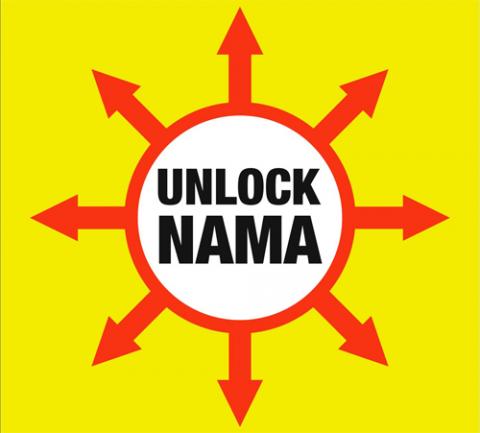Unlocking NAMA

This Saturday one of NAMA’s properties in Dublin will be opened to the public. The building will host a series of talks and workshops engaging the public in the questions that surround debt, property speculation and asking how we can use NAMA buildings for social and community purposes.
You might be thinking: has the notoriously secretive agency finally read the part of the NAMA legislation that says NAMA should contribute to the social development of the State? Or wondering if perhaps the Labour party is coming good on its pre-election promise to use NAMA buildings for culture and the arts? Maybe the accountants and property hacks that sit on NAMA’s board have recognised that the N and the A stand for national assets?
What’s really happening is the launch of new campaign group Unlock NAMA.
Whereas NAMA is all about giving public money to private banks, Unlock NAMA want to make public buildings available to the public. Rather than socialising commercial losses, we say socialise resources.
The problem is that NAMA is designed to make this as difficult as possible. The lack of transparency or of any mechanism for engagement with the public makes it hard to know where NAMA’s properties are, and even harder to gain access to them.
To challenge this Unlock NAMA will be combining research, education and direct action, and this Saturday’s launch will be an example of all three. We have identified a NAMA building in Dublin and will hold talks and discussions there from 12 till 6pm. Conor McCabe, author of Sins of the Father, will discuss the ins and outs of NAMA and the role of property speculation more broadly. Economist Michael Taft and researcher Andy Storey will introduce the Anglo: Not Our Debt campaign and talk about the social and political questions around debt. And Unlock NAMA will host a workshop dealing with exactly what kind of ‘assets’ NAMA has and how we can identify them.
And all of the above will take place in a temporarily occupied NAMA building, showing that through collective action we can develop real alternatives.
The location of the building will go out on social media at 9.30am on Saturday morning, so keep an eye on facebook.com/unlocknama and follow @unlocknama on Twitter.
You can also check out the soon to be launched unlocknama.org
Full Programme
12 noon: Conor McCabe (author of Sins of the Father) on NAMA and Property Speculation in Ireland
2.30pm: Andy Storey (lecturer in politics and international relations) and Michael Taft (research officer, UNITE) on the Anglo: Not Our Debt campaign
4pm: Unlock NAMA: What buildings does NAMA have and how can we identify and gain access to them?
About Unlock NAMA
Unlock NAMA is a campaign to access NAMA properties for social and community use and to hold NAMA to account. While NAMA is all about giving public money to private banks, we want to make public buildings available to the public.
NAMA’s bank bailout has been a complete failure: the banks have needed more hand outs and even nationalisation, yet they still are not lending.
Meanwhile NAMA is squandering the property it has acquired and providing massive debt forgiveness to developers.
To challenge this we will:
• Pull back the veil of secrecy NAMA hides behind by identifying the assets it holds and what is being done with them. We will be the watchdog NAMA does not want.
• Work with anyone who wants to put existing NAMA assets to social or cultural uses by helping to identify the NAMA buildings in their local area and by supporting them in gaining access to those buildings. While NAMA wants to socialize commercial losses, we want to socialize resources.
• Challenge debt. From the national debt generated by NAMA to family mortgages, debt is robbing us of our individual and collective future.
Our Demands:
1 )Make NAMA properties available for social and community use
2) Publish full addresses and details on all properties under NAMA
3) Publish full details on all sales of NAMA assets
The cycle of austerity and debt offers us no future. Unlock NAMA is about building a future beyond bank bailouts and property speculation.
